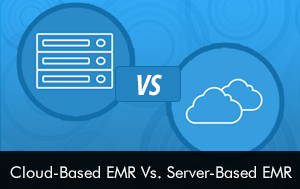When selecting an Electronic Medical Records (EMR) Software for their healthcare clinic, physicians have two major options to select from.
The first option is a Server-based EMR Software, where all the medical and clinical data is managed through in-house local computer servers. In server-based systems, the maintenance and up-gradation of the software are managed by the user himself, while the software safety and security are also the responsibility of the user himself.
The second option, Cloud-based EMR Software, is quite different. In a cloud-based system, the data and records of the practice are stored on an external cloud server located online. The good thing about cloud-based software is that it can be remotely accessed from outside the office, provided the user has an active internet connection.
Each type of these Electronic Health Records (EHR) Systems has its own pros and cons when it comes to the safety and security of data stored within them.
Server-Based EMR Software
In the case of Server-based EMR/EHR or Practice Management (PM) Software, the responsibility of security of the in-house server holding all the clinical and administrative data fall solely on the user. Physicians might consider using firewall protection, security backups, and recovery plans to make sure the data stays safe with them. The backups of server-based software are also relatively more vulnerable to breaches in case the data is left unencrypted.
Having on-site storage of data offers more practices control, yet it also increases the risk of loss through hard-drive crashes, data corruption, or even natural disasters.
What this essentially means is that to ensure the security of their medical records, medical practices using Server-Based EMR Systems require a stronger IT staff and security approach, while still being prone to data loss or theft at all times.
Cloud-Based EMR Software
A Cloud-Based EMR Software solves all the security issues as are with Server-Based Systems, although they have their own pros and cons. The data is not stored with you physically, although gets stored in a safe virtual location. Cloud-Based EMR Systems also achieve HIPAA Compliance through their high-level encryption methods and bank-level security measures. The hosts also have highly qualified and professional tech-support available 24/7 which monitor all the security measures.
In events of catastrophe, data stored in a virtual cloud remains completely safe and even if a disaster hits, the data still remains accessible through an internet-enabled device.
Final Verdict
An enormous amount of sensitive data is already being stored in the cloud from all over the world. These systems are being trusted with everything from our shopping info to social media, and even banking data. With the stable and secure atmosphere developed by these cloud-based technologies, it is quite evident why more and more clinics and healthcare facilities are opting for the comfort and affordability of the Cloud over a Server-Based EHR System.







